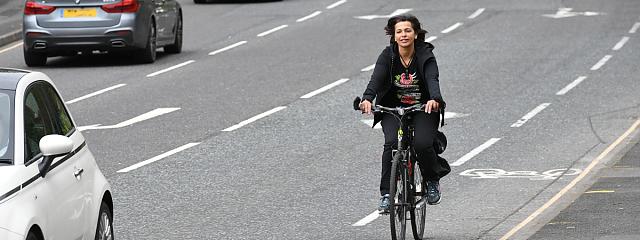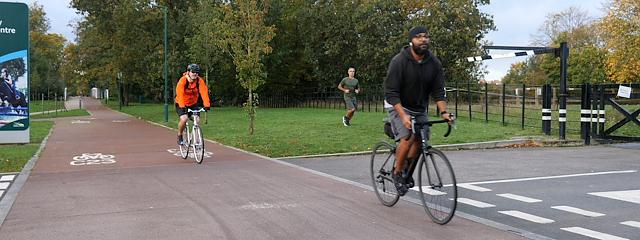
Cycling UK prepares for legal challenges to bike lanes' “unreasonable” removal
Cycling UK prepares for legal challenges to bike lanes' “unreasonable” removal
This drastic action follows in the wake of the Royal Borough of Kensington and Chelsea’s removal of a well-used cycle lane on High Street Kensington in London last week citing the lanes caused congestion. According to BetterStreets4KC chair Justin Abbott “Levels of congestion were unaffected by the cycle scheme.”
Find out more about the Cyclists' Defence Fund
There are now no separated cycle lanes and there has been no discernible benefit in terms of congestion reduction.
Cycling UK is also alarmed by West Sussex Council’s plans to remove a popular cycle lane introduced during lockdown along Upper Shoreham Road in Shoreham.
This cycle lane recently featured in a short film produced by the Department for Transport, showing the benefits cycle lanes can bring to local communities. Cycling UK has written to the council requesting a pause in these plans, and a clarification of the process which led to this decision.
The national charity is concerned this pattern of behaviour of removing cycle lanes and traffic calming measures, is not just increasing but is being done without adequate evaluation of their benefits, and without sufficient time to conduct effective trials.
Duncan Dollimore, Cycling UK’s head of campaigns said:
“Cycling UK is alarmed that decisions some councils have made in recent weeks, ripping out cycle lanes, have been knee jerk responses to objections from a vocal minority rather than upon consideration of the evidence and benefits of the schemes.”
YouGov polling commissioned by Cycling UK in November has shown more than half of the UK’s population (56%) supports wider roll out of government schemes to encourage more cycling and walking, while only a fifth (19%) opposes them.
Changing ingrained travel habits doesn’t happen overnight, so when councils introduce temporary cycle lanes they need to leave them in place long enough to carry out an effective trial
Duncan Dollimore, Cycling UK
“Separated cycle lanes can carry more people in less space, and reduce congestion,” said Mr Dollimore. “They are good for local businesses, with people cycling and walking into town centres staying there longer and spending more money; and the evidence shows that if you build them, people will use them.
“But changing ingrained travel habits doesn’t always happen overnight, so when councils introduce temporary cycle lanes they need to leave them in place for long enough to carry out an effective trial. ‘Who shouts loudest’ should not be the basis of their evaluation – and before any drastic action is taken to scrap new bike lanes.”
Upon receipt of legal advice, Cycling UK will consider the possibility of legal action where cycle lanes that were working for people and communities have been removed either unreasonably or where the proper process has not been followed.
Since May 2020, the Department for Transport has provided £220 million through the Active Travel Fund to councils in England to introduce new cycling and walking facilities. This funding is to help local authorities relieve pressure on public transport, increase opportunities for social distancing and create sustainable alternatives for shorter journeys, and is part of the Government’s promised £2bn for cycling and walking over the next five years.
£27.4 billion is being invested over the next five years through Highways England’s roads plan to ensure the road network is fit for the future and safe, reliable and efficient for drivers and businesses.
For more information, please contact the national Cycling UK press office. Due to the restrictions caused by the coronavirus outbreak, currently the main press office number (01483 238 315) is not being monitored. If you would like to speak to a member of the press office during working hours (0900 - 1700) please email publicity@cyclinguk.org. Out of hours, call 07786 320 713
-
Cycling UK, the national cycling charity, inspires and helps people to cycle and keep cycling, whatever kind of cycling they do or would like to do. Over a century’s experience tells us that cycling is more than useful transport; it makes you feel good, gives you a sense of freedom and creates a better environment for everyone. www.cyclinguk.org
-
Cycling UK will also be seeking legal advice concerning the requirement on councils to comply with new statutory guidance issued in 2020 under the Traffic Management Act 2004. These concern not just requirements when reallocating roads space to cyclists and pedestrians, but also when local authorities seek to reverse those decisions by taking out cycle lanes and active travel schemes.
-
For reporting on the removal of High Street Kensington cycle lane see: https://www.standard.co.uk/news/transport/kensington-cycle-lane-axed-refund-government-cash-b115087.html
-
For comments by BetterStreets4KC see: https://www.ciht.org.uk/news/anger-over-kensington-cycle-lane-removal/ For reporting on the removal of the Upper Shoreham Road see: https://road.cc/content/news/pop-cycle-lane-government-cycling-promo-scrapped-279031
-
For the Department for Transport short film see: https://twitter.com/transportgovuk/status/1327160020774105088
-
For further information on Cycling UK’s YouGov polling see: https://www.cyclinguk.org/press-release/new-research-finds-public-overestimates-opposition-new-bike-lanes-50
-
For details on the Department for Transport’s latest funding for cycling and walking measures see: https://www.gov.uk/government/news/175-million-more-for-cycling-and-walking-as-research-shows-public-support














